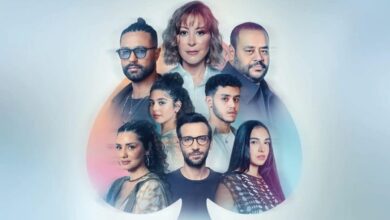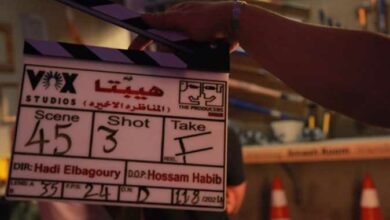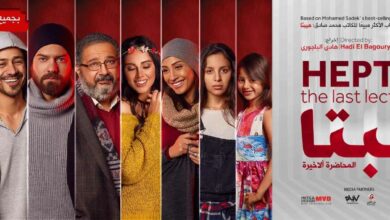
Eshtebak (clash)
The 98-minute film, written and directed by Diab, depicts the political turbulence and uncertainty after the ouster of former president Mohamed Morsi in 2013, particularly the conflict between supporters of the Muslim Brotherhood and those backing the military.
The film is set entirely in the back of a police van, into which both Brotherhood and military supporters had been thrown, in the wake of demonstrations following the overthrow of Morsi in July 2013.
Nawara
Through the life of a domestic helper named 'Nawara' working for a rich family in Cairo, the film reflects the humanitarian and social conditions of Egyptians before and during the January 25 Revolution that toppled former President Hosni Mubarak. The film is directed by Hala Khalil.
This movie has won several awards, as actress Menna Shalabi who plays the title role of Nawara won the Best Actress Award at Morocco’s Tetouan International Mediterranean Film Festival and Dubai International Film Festival (DIFF).
In June 2016, the movie was screened at the 23rd Munich Film Festival and was also selected among the opening and closing films of the 6th Malmo Arab Film Festival in Sweden.
Hepta
The movie is based on a novel written by Mohammed Sadek in 2014. The story is about a renowned social-psychology specialist, Shukri Mokhtar, who decides to give one last lecture about the very simple question of "How do we love?" Through four different stories, the movie answers this question by showing the seven 'stages of love'.
Hepta participated in the Festival of Arab Camera in Rotterdam. Moreover it competed for the Golden Award for Feature Films at Annaba Mediterranean Film Festival, where the film grabbed the attention of both critics and audience. The movie was chosen as one of the opening and closing films at the 6th Malmo Arab Film Festival in Sweden, where it was nominated for the Best Feature Film Award.
Meanwhile, the movie won the audience award at the Annual Arabian Sights Film Festival in Washington D.C. In addition, the movie participated in the Anab d'Or in the Feature Film Competition at the 2nd Mediterranean Film Festival of Annaba (FAFM) in Algeria and was screened at the Arab Camera Festival in Rotterdam.
Jeanne d'Arc
Influenced by Carl Dreyer’s 1928 film The Passion of Joan of Arc, the movie is a modern documentary, which through dancing, poetic narrative and mythology, sheds light on women's circumstances and issues of women’s emancipation in post-2011-uprising Egypt.
Through interviews with several women, including artists and a poetic voiceover, the film draws attention to women’s repression and their suppressed feelings of guilt, especially among Egyptian female artists. The film is directed by Iman Kamel.
Jeanne d'Arc was screened at the 13th Dubai International Film Festival (DIFF) in December 2016.
Jareedy
Directed by Mohamed Hisham, the film highlighted the the story of a Nubian boy named Konnaf who faced his life with fear but in the end overcame it. Konnaf's challenge was to reach a rock in the middle of the Nile through a traditional boat which is 'Jareedy' as he is not a swimmer, which is unusual for one who lives on the banks of the Nile.
During the journey, the Nubian boy is guided by an old boat craftsman who witnessed the displacement from Nubia in 1964. After telling the young boy stories from the past, he succeeds in helping Konnaf to reach his dream.
Jareeedy was shot in Nubia and tells the hidden stories in its own mother language, drawing attention to the marginalization of the Nubian people.
The movie was awarded Best Cinematography at London Film Festival in the UK. It participated in several other festivals, including Jaipur Film Festival in India, Afrika Film Festival in Belguim and the 12 Months Film Festival in Romania.
Mawlana (The Preacher)
Directed by Magdy Ahmed Ali, the film's poster showcases actor Amr Saad alongside a sentence that reads: “There are more than 120,000 preachers in Egypt's mosques. This is the story of one of them.” The story is based on a novel by the same name, written by Ibrahim Eissa.
Saad plays the character of Sheikh Hatem, a young preacher who was working in a governmental mosque then became a TV celebrity. Saad earlier told Al-Masry Al-Youm that the movie shows the lives of several sheikhs and calls for the reform of religious discourse. He added that the movie will be shown in several countries, including China, Malaysia and Latin America.
Mawlana was chosen to be screened at the Dubai International Film Festival (DIFF).
Har Gaf Sayfan (Dry Hot Summers)
This 30-minute film depicts the story of two lonely people at opposite chapters of life: the old Shawky and young Doaa accidentally meet on a scorching hot summer day in a Cairo taxi. They are both overcome by their gringing day-to-day routines, but suddenly, their race through the city evolves into a journey of self-discovery that reconnects them to life.
The film was directed by Sherif Elbendary, grabbing widespread attention as it premiered at the DIFF 12th edition in December 2015. While in April 2016, the movie was selected to open the 18th edition of the Ismailia International Film Festival for Documentaries and Shorts.
In February 2016, Har Gaf Sayfan (meaning "Hot and Dry in Summertime") won the Robert Bosch Stiftung Film Award for International Cooperation at a gala held during the 'Berlinale Talents', an annual summit and networking platform of the Berlin International Film Festival for 250 outstandingly creative filmmakers.
Moreover, the film participated at the Carthage International Film Festival in October and was also screened at the Dhofar Arab Film Forum in Oman in August.
Tuk Tuk
The film tells the story of kids who are working as TukTuk drivers in the streets of Cairo, through a camera trip in Egyptian slums. The film is directed by Romani Saad.
Speaking to Al-Wafd newspaper, Saad said that he tried to come closer to the real life of these street children to create a concrete background about their experiences and social conditions, pointing out that he chose two children and asked them to let him into their daily lives without his interference in their actions.
The movie participated in the Tetouan International Mediterranean Film Festival.
In the Last Days of the City
The movie talks about a 35 years old filmmaker ' Khalid' who faces a loss in his life, then he decides to shoot a film that captures the soul of the city but he gets in trouble; Khalid's friends support him to overcome the struggles and send him footages from Beirut, Baghdad and Berlin which enthuses him to keep going through the difficulty and capture the beautiful atmosphere of Cairo.
The movie is directed by Tamer Al-Saied and it is a co-production between Egypt, Germany, the U.K., and the U.A.E.
The film had its world premiere at the Berlinale talents, where it was awarded the Caligari film prize. However, the film was excluded from the Cairo Film Festival this year. It was the only work by an Egyptian director to take part in the 46th annual Berlinale Forum and win the Grand prize at the MFF T-Mobile Nowe Horyzonty Film Festival in Wroclaw.
Moreover, the film participated at the Pesaro Film Festival in Italy; Olhar Cinema Curitiba Film Festival in Brazil; and Malta's Valletta Film Festival.
Who Killed the Armenians
The film is the first of its kind produced in Egypt and dedicated to the Armenian Genocide. It was directed by Egyptian satellite TV anchor Myriam Zaki and film director Mohamed Hanafi.
The 70-minute film was shot in Armenia, Egypt, and Lebanon, from where it presents rare documents, testimonies of survivors of the genocide and footages that prove the violent acts by Ottoman Turks against the Armenian nation, beginning with the Hamidian Massacres (1894-1896), the Adana Massacre (1909), and the 1915 genocide. These documents were revealed to Arab audiences for the first time.
The film won the Audience Award at the New York Film Festival and the director was awarded the Vanya Exerjian prize for Empowering Women and Girls.
Um Ghayeb (Mother of the Unborn)
Directed by Nadine Salib, the movie talks about a woman 'Hanan' who is yearning for a child for 12 years. She lives in a small village in Upper Egypt where it is common for women who suffer infertility to be called "Um Ghayeb".
In spite of its international recognition, this extremely humanistic movie was only screened one single time in Egypt by Zawya, according to director Nadine Salib. The movie was screened in IDFA, along with the Thessaloniki Documentary Film Festival, the Sheffield Documentary Film Festival, and Yamagata Film Festival in Japan.
It also participated in Carthage Film Festival and won the Best Documentary Award at Abu Dhabi festival. It also received the Peter Wintonick Special Jury Award for First Appearance at the IDFA 2014. It moreover won the first prize for Best Documentary in Mizna Twin cities, and the award for best documentary in AfryCam Film Festival.
Ali, Mea'za we Ibrahim (Ali, the Goat and Ibrahim)
The film tells the story of Ali who suffers the loss of his beloved fiancé who has died; Ali then falls in love with a goat naming it with the same name of his fiancée 'Nada'. Ali's mother insists on visiting a healer. At the healer’s clinic, Ali meets Ibrahim who works at a recording studio and claims that he hears voices frightening him; the healer said that both Ali and Ibrahim are “cursed” and their medication is to throw three “magic” stones in Egypt’s three water bodies.
Ali, Ibrahim and the goat start on a long adventure that takes them to the Mediterranean, the Red Sea and the Nile, building a good friendship along the way.
The movie had its MENA premiere at the DIFF and the actor Ali Sobhy, one of the cast, won the prize of best actor at "Al-Muhr Al-Tawil" competition at DIFF.
Abadan Lam Nakon Atfal (We Have Never Been Children)
The film is about a divorced woman who looks after her four kids. By and by, her life circumstances change gradually. The film is directed by Mahmoud Soliman and it is co-produced by four countries, including Egypt, the UAE, Qatar, and Lebanon.
The movie was premiered at the DIFF where it won the Best Muhr Non-Fiction Feature Award. Moreover, it was awarded the Special Jury Prize in the Documentary Films category. It also participated in the Tetouan International Mediterranean Film Festival in March.
Hayat Tahra (Tahra's Life)
The movie tells the story of Tahra, a woman from Upper Egypt who worked in all the men-restricted jobs including construction, bricks and cement lifting, metalurgy-related jobs, as well as sewing, all to earn a good life for her five children after her husband's death. These professions, along with several small projects enable her to raise LE 150,000.
This movie was directed by Mohanad Diab and was premiered at the Shorts Corner at the 68th Cannes International Film Festival. The movie was screened also at Dhofar Arab Film Forum.
Haram El Gasad (Sins of the Flesh)
Directed by Khaled El Hagar, the film was shot in only one location farm in the desert, using only fire and kerosene lamps, no electricity. The film is a drama set against the 25th of January uprising. The story examines love, revenge, passion and the misuse of power of four people who live on a desert farm during the uprising of 2011 and who get their news only via the radio. It shows how what was happing in the farm reflected what was happing in Egypt.
The movie participated in Carthage International Film Festival within the long feature film section, and was selected for screening at the 2016 Vancouver International Film Festival.
Rabie Shetwy (Wintry Spring)
The film is directed by Mohamed Kamel. It tells the story of Nour a schoolgirl who lives alone with her father, and is going through a very critical period in her life, as suddenly she is becoming a woman. She cannot reveal this to her father and keps it as her own secret, so her father cannot understand this change that occurrs in her life, which results in tension between them.
The film won the best short film and best actor awards from the Italian festival Fotogramma d'Oro and the Best Short Film Award at the Sose International Film Festival.
The movie, moreover, was selected for screening at the Shorts Festival which chooses films shorter than 20 minutes that have received more than one award in 2015,.
Al-Nossour Al-Saghira (The Small Eagles)
The film tells the story of Mohamed, the son of a simple worker in the city of Alexandria, where he dreams to move to Cairo, to become a filmmaker. He then meets Ali, Salma and Bassam. Mohamed finds that his new friends' parents were leftists which enthused him to search in his father's histor, hoping maybe to find something precious.
The film is directed by Mohamed Rashad and had its world premiere at the 13th DIFF.
Al Ma'a Wel Khodra Wel Wagh El Hasan (Water, Greenery, and a Beautiful Face)
Directed by Yousri Nasrallah, this movie depicts the troubles of Egyptian traditional marriage by telling the story of a family in a small Egyptian village preparing for a big wedding celebration.
The film was screened in the Locarno International Film Festival competition that included 17 movies from Greece, Portugal, Germany, Italy and several other European countries.
Withered Green
This indie drama narrates the life of a conservative girl Iman's who feels stuck in antiquated traditions and norms especially after losing her parents; she attempts to convince any of her uncles to attend her younger sister's engagement in her deceased father's place, as is traditional. However, a shocking discovery prompts her to do away with all these withered traditions that she once clung to.
Directed by Mohamed Hammad, the movie won the "Directors of the Present" competition at the Locarno International Film Festival where it premiered.
Moreover, it was also the first Arab movie to ever be screened at the Singapore International Film Festival, in addition to being screened at the Festival International du Film Francophone de Namur (FIFF) in Belgium.
Bara fe El-Share (Outside on the Street)
The film is based on a group of workers of Helwan neighborhood in Egypt. The film showed 10 workers joined in an acting workshop, but during the rehearsals they tell the stories of injustice inside the factory, the violence of the police, of courts that fabricate charges and an endless number of stories of corruption and exploitation by the employers.
The movie is directed by Jasmina Metwaly and Philip Rizk and won the Best Feature Film Award at the 5th Latin-Arab International Film Festival in Buenos Aires. It was screened within the official selection at the 26th edition of the Carthage in Tunisia, in addition to its featuring at the German Pavilion at the Venice.
Coma
The movie takes one on a long journey inside the human-self to restore memories, confront fears, and appreciate the blessings they have in life. As It tackles how we value people and objects from a human-interest perspective.
The movie is directed and produced by the young director Ghada Ali. The movie participated in the Fez International Film festival of Cinema & Education in Morocco, along with OZARK Shorts Film Festival in Missouri in the United States, GATFEST Film Festival in Jamaica.
The film was selected for screening at the Asia International Youth Short-Film Exhibition in Wenzhou, China, The Colour International Film Festival in India, and the International Women's Film Festival in Kabul.
It has also won many awards including the Official Selection for the Biennial Edition of Ciné Women of America and the Best Cinematography award at FILMSAAZ of India.
Before the Spring
In 2008, the film maker travelled to Egypt to tell the story of metal and rock bands' struggles in a conservative Muslim country.
"We meet the kids in Cairo's tight-knit underground music scene who are the film's main characters, including the sons of the country's foremost political dissidents and the Muslim World's first all-female metal band," the film makers said.
After the 2011 uprising, the film makers shed light on new horizons and presented the main characters with a new set of life-changing dilemmas.
Directed by Jed Rothstein, the movie won the New York Festival's Grand Prize for Best Narrative Feature Award.
Osbou we Yomen (One Week and Two Days)
The film which is directed by Marwan Zain talks about the love story of a couple who faced some troubles over their decision of giving birth.
The movie made it to the competition in the 13th DIFF Muhr Shorts category.




